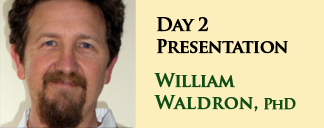William Waldron, PhD, Chair, Department of Religion, Middlebury College.
This presentation will outline the Buddha’s basic understanding of our cognitive processes. It will discuss the factors involved in the ‘dependent arising’ of cognitive awareness, the correlative co-arising of our ‘world’ (loka), and our ingrained sense of self. It will then show how these analyses were elaborated in the later Yogācāra tradition (3-4th c CE), which argued that most of these processes occurr nonconsciously and are deeply influenced by language and concepts, imminently social phenomena. These inform our nonconscious sense of self (self-making) as well as our collective construction of a species-specific ‘world’ based on our innate sense of subject-object duality, i.e. the Cartesian Theater. These constructive processes are so deeply hidden that we falsely imagine the world consists of real substantial entities—such as selves, objects, etc.—in other words, objectivist, essentialist perspective, such as in enshrined in some views of modern science, is an unconscious collective construction. Yogācāra doctrines thus not merely critique this objectivist view, they also explain why we so readily, so naturally, see the world that way, and then suggest how, through analysis and insight, we might ‘wake up’ from our collective slumber. This process is articulated in the Yogācāra model of the Three Natures.
360 Video Login required
